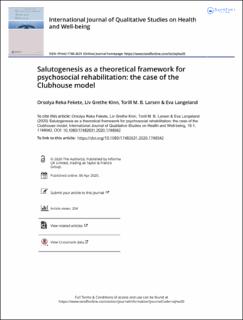| dc.contributor.author | Fekete, Orsolya Reka | |
| dc.contributor.author | Kinn, Liv Grethe | |
| dc.contributor.author | Larsen, Torill Marie Bogsnes | |
| dc.contributor.author | Langeland, Eva | |
| dc.date.accessioned | 2021-03-10T13:08:38Z | |
| dc.date.available | 2021-03-10T13:08:38Z | |
| dc.date.created | 2020-05-07T13:03:46Z | |
| dc.date.issued | 2020 | |
| dc.identifier.issn | 1748-2623 | |
| dc.identifier.uri | https://hdl.handle.net/11250/2732646 | |
| dc.description.abstract | Purpose: This study explored whether the holistic theory of salutogenesis may be a suitable theoretical framework for the Clubhouse model of psychosocial rehabilitation, a pioneer among psychosocial rehabilitation programmes.
Methods: A systematic examination of elements of the Clubhouse model, as prescribed by the Clubhouse standards, was performed within the context of the theory of salutogenesis including its basic salutogenic orientation and the main concepts of sense of coherence and resistance resources.
Results: We found that several standards and practices within the Clubhouse model can be understood as applications of salutogenesis. We have hypothesized that the Clubhouse model promotes peoples’ sense of coherence and mental health. However, our investigation also showed that, to enhance the recovery of Clubhouse members, more explicitly incorporating some salutogenic principles, such as “appropriate challenges” and “active adaptation as the ideal in treatment”, may benefit Clubhouse practice.
Conclusions: The Clubhouse model of psychosocial rehabilitation is very consistent with the salutogenic orientation and main salutogenic concepts. The present study suggests that salutogenesis may be a suitable theoretical framework for the Clubhouse model and possibly in the psychosocial rehabilitation field in general. | en_US |
| dc.language.iso | eng | en_US |
| dc.publisher | Taylor and Francis | en_US |
| dc.rights | Navngivelse 4.0 Internasjonal | * |
| dc.rights.uri | http://creativecommons.org/licenses/by/4.0/deed.no | * |
| dc.title | Salutogenesis as a theoretical framework for psychosocial rehabilitation: the case of the Clubhouse model | en_US |
| dc.type | Journal article | en_US |
| dc.type | Peer reviewed | en_US |
| dc.description.version | publishedVersion | en_US |
| dc.rights.holder | Copyright 2020 The Author(s). | en_US |
| dc.source.articlenumber | 1748942 | en_US |
| cristin.ispublished | true | |
| cristin.fulltext | original | |
| cristin.qualitycode | 1 | |
| dc.identifier.doi | 10.1080/17482631.2020.1748942 | |
| dc.identifier.cristin | 1809793 | |
| dc.source.journal | International Journal of Qualitative Studies on Health and Well-being | en_US |
| dc.source.40 | 15 | |
| dc.source.14 | 1 | |
| dc.identifier.citation | International Journal of Qualitative Studies on Health and Well-being. 2020, 15 (1), 1748942. | en_US |
| dc.source.volume | 15 | en_US |

